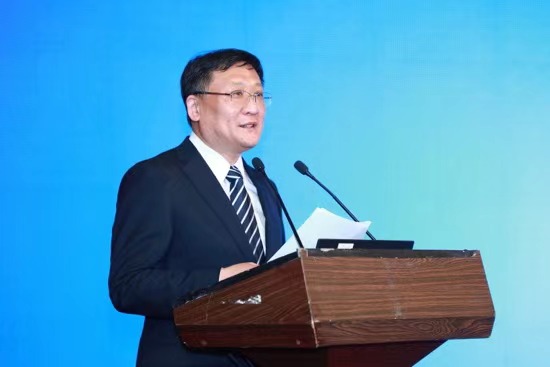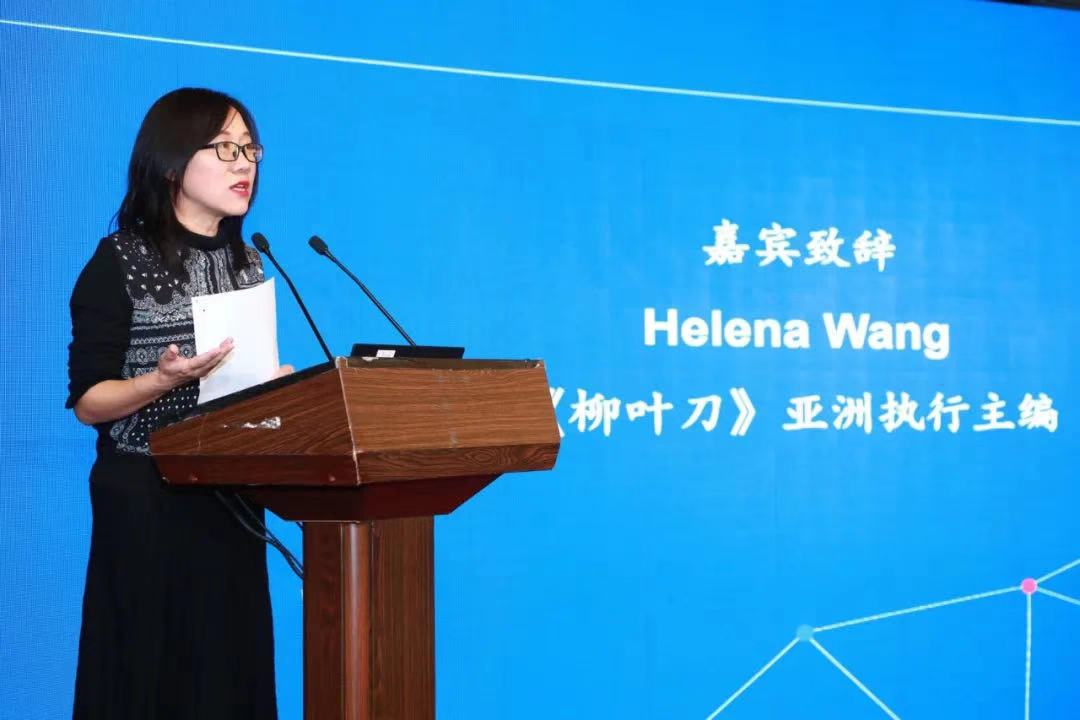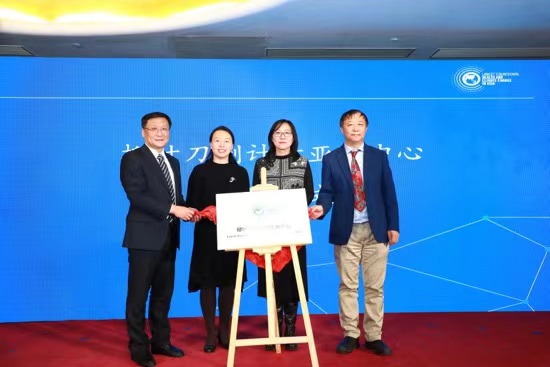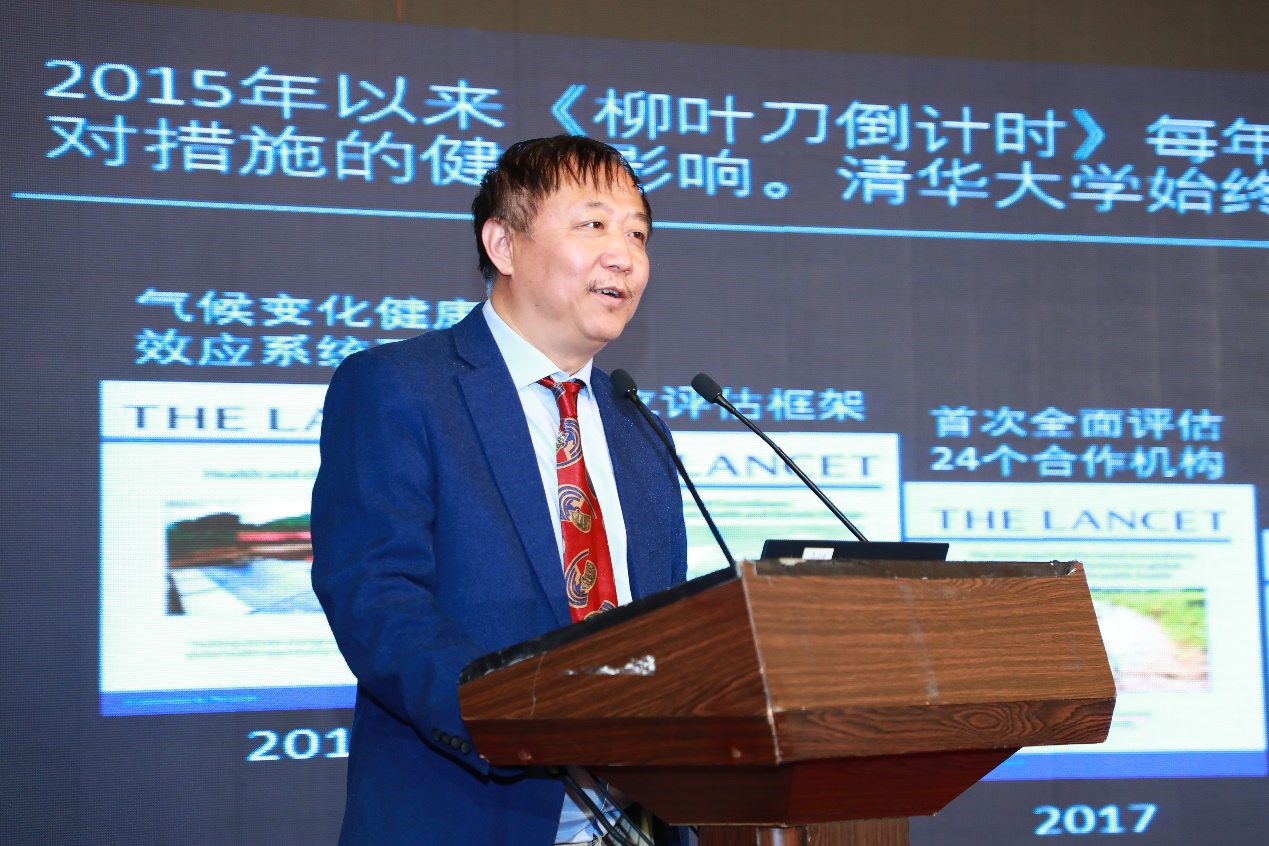On December 3, 2020, the Lancet Countdown Guide, hosted by the Lancet Countdown Asia Center, and co-organized by the Department of Earth System Science (DESS) of Tsinghua University, was held at Beijing Wenjin International Hotel.

Yong Luo, deputy dean of the DESS, Tsinghua University, presided over the press conference.

Helena Wang, Asia Editor-in-Chief of The Lancet, delivered a speech.
The press conference was hosted by Professor Yong Luo, Associate Dean of DESS, Tsinghua University, and special guest Helena Wang, Asia Editor-in-Chief of The Lancet, Co-Chairman of The Lancet Countdown, Professor Anthony Costello of Global Health and Sustainable Development, University College London addressed the event at the conference site and via video.

Activity scene
This conference was conducted by a combination of online and offline, and simultaneous global bilingual live broadcast. Many experts and scholars from the team of the authors of the report, relevant persons from the Publicity and Education Center of the Ministry of Ecology and Environment, the China Meteorological Administration, and more than 50 media including Xinhua News Agency, People's Daily, Global Times, Health News, Science Bulletin, and The Paper participated the press conference.
Affected by human activities, the global climate has shown a significant warming trend in recent decades, which has led to extreme weather and climate events such as high temperature and heat waves, droughts, floods, and forest fires, as well as a series of issues such as food security and sea level rise. Health has a major impact. In this context, since 2015, more than 120 experts from more than 30 top academic institutions around the world have completed the Lancet Countdown Report as a professional report that comprehensively analyzes climate change trends and provides policy recommendations for governments. It has received great attention from governments, academic institutions and the public.
As one of the major events of the Lancet Countdown this year, two reports were released at this conference-The Lancet Countdown Global Report 2020 and the first The Lancet Countdown China Report.
Global Report: Strengthen Synergies and Combat Complex Crisis
Since 2015, the Lancet Countdown Global Report has continuously monitored the health effects of climate change every year, and conducted independent assessments of actions to address climate change. The Lancet countdown released this year's fifth global report. Compared with last year, this year’s report includes 43 indicators. The new indicators include heat-related premature death, climate migration and displacement, access to urban green space, health benefits of low-carbon diets, extreme heat and heat-related labor productivity losses economic costs, net carbon prices, and the number of health-related issues included in the Nationally Determined Contributions (NDC) of each country.
The report sorts out the actions taken to address climate change on a global scale in 2019. In terms of positive actions, the report mentioned that renewable energy provided 11.5 million jobs in 2019, an increase of 4.5% over 2018. In terms of low-carbon power generation, low-carbon energy power generation continues to rise, with an increase of 10% in 2017 over 2015. Among them, China is the most important contributor. In terms of healthy travel, the number of global electric vehicles in 2018 increased by 65% over 2017. The report also sorts out the negative impact of climate change on the world. For example, the number of heat wave exposures experienced by people over 65 globally has increased by 475 million times from the 1986-2005 average, breaking the 2016 record. In terms of coal consumption, after a brief decline in previous years, it has continued to rebound. In 2018, it was 1.2% higher than 2017 and 74% higher than 1990. In terms of outdoor air pollution, the total number of premature deaths related to outdoor air pollution worldwide is still on the rise.

Peng Gong, Dean of the School of Science and Dean DESS of Tsinghua University, made the report interpretation.
As a guest of interpretation of the global report, Professor Peng Gong, who is also the global co-chair of the Lancet Countdown Project, said, “In the future, facing multiple complex crises at the same time will become the new normal. We must strengthen synergistic effects between different policies and goals. For example, only by organically combining recovery plans to address climate change and the COVID-19 pandemic, we can effectively respond to these intertwined crises."
China report: wide spread area, many action results, big room for improvement
Unlike previous press conferences, the first Lancet Countdown China Report was released at this press conference. The report was co-written by more than 70 experts from 19 top academic institutions domestic and overseas. The report reveals the impact of climate change on the health of people in various provinces in China by tracking nearly 30 changes in indicators related to China's climate change trends and their impact on population health. At the same time, the report simulates the actions taken by China to mitigate climate change and the health benefits of the population. In addition, the report also put forward relevant policy recommendations for promoting low-carbon development and building a healthy China.
The report shows that all provinces and cities in China are affected by various health problems caused by climate change to varying degrees. For example, in the Heilongjiang region of northeastern China, wildfires and other disasters threaten the safety and health of local residents; and Guangdong Province, which is in the southeast coastal region of China, has also suffered labor losses due to heat waves, typhoons, and dengue fever.
Through research, it is found that under the leadership of the Chinese government and the joint actions of the whole society, China has achieved some results in tackling climate change. Data show that carbon dioxide emissions per unit of GDP in 2019 have dropped by 48% compared to 2005, exceeding the goal originally set for 2020. In addition, China's investment in new coal power plants has been on a downward trend since 2015. At the same time, investment in low-carbon power has increased significantly, and its investment scale is 9 times that of coal power. Among them, the scale of investment in renewable energy in 2019 reached 86.4 billion US dollars. The report also analyzes PM2.5 issues that are of general concern to the public. Data show that compared with 2015, the PM2.5 concentration in major cities in China has dropped by 28% in 2019, and the number of deaths due to air pollution has also decreased by nearly 90,000.
But at the same time, compared with other countries, China still has a certain gap in formulating climate change-related plans. At present, 51 countries around the world have formulated national-level adaptation planning documents that combine climate change with population health, and 48 countries have completed scientific assessments of the impact of climate change on population health. At present, only 3 provinces and cities in China have formulated the above-mentioned planning documents, and only 6 provinces and cities are carrying out relevant assessment work.
In response to the challenges brought about by climate change, the Lancet Countdown to China Report also put forward corresponding policy recommendations. For example, multiple departments should work together to fully estimate the health risks caused by climate change; appropriate measures should be formulated to address the health risks of climate change; scientific research and public awareness on the health effects of climate change should be strengthened; and carbon emissions reduction should be accelerated, and formulate a healthy carbon neutralization path. The report also addresses the economic impact of the COVID-19 pandemic prevention and control measures, and suggests that the important factor of population health must be fully considered when formulating an economic recovery plan for the COVID-19 pandemic.
As one of the lead authors of the Lancet Countdown China Report, the director of the Lancet Countdown Asia Center, and associate professor Wenjia Cai from DESS of Tsinghua University, said that as the world's largest carbon dioxide emitter and the residence of one-fifth of the world's population , China’s response to the climate crisis is of vital importance to China and the world. On the basis of many proactive health policies that have already been promulgated, China should further upgrade and formulate more climate action plans, so as to prevent the entire country from being threatened by climate change.
The impact of climate change on population health cannot be ignored. Faced with the health challenges brought about by climate change, the Lancet Countdown report made the world and the whole society fully aware of the existence of health risks, and provided a scientific basis for making predictions. To slow down the pace of climate change, the world should work together to build a healthier and brighter future.
Audit: Luo Yong, Wu Haiping, Cai Wenjia
Text: Wang Jiayin
Picture: The Lancet Countdown Asia Center